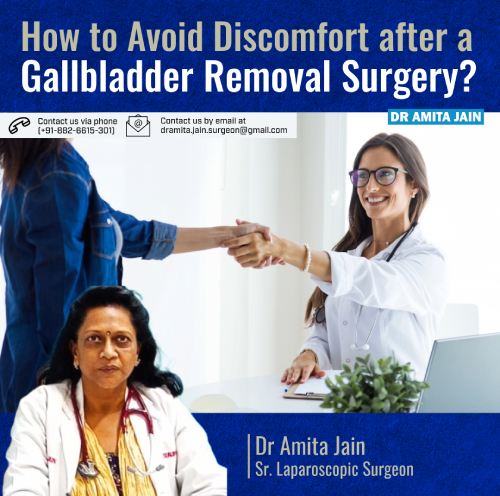Have you recently had your gallbladder removed through surgery? If you have, you might be wondering about the possibility of experiencing digestive discomfort in the aftermath of the procedure. This small, pear-shaped organ, situated just below your liver, plays a crucial role in aiding the digestion of fatty foods by storing and releasing bile produced by the liver. This bile is essential for your body’s ability to process fats. Gallbladder surgery, known as cholecystectomy, is a fairly common procedure, often recommended to alleviate the discomfort caused by gallstones or other gallbladder-related issues. While the gallbladder isn’t indispensable, its absence can lead to digestive challenges.
How to avoid discomfort after a gallbladder removal surgery?
Dr Amita Jain, who is one of the leading gallbladder removal surgeons in Delhi NCR in the field of laparoscopic surgery talks about the various ways in which you can get rid of the discomfort after surgery.
1. Go Slow With Your Diet
After the gallbladder removal, your digestive system undergoes adjustments. Start with a bland diet consisting of easily digestible foods like plain rice, applesauce, and toast (often referred to as the BRAT diet). Gradually reintroduce other foods, focusing on low-fat options and smaller, more frequent meals to minimize digestive distress. Choose small, light meals and slowly reintroduce a variety of foods to assess how your body reacts. Avoid heavy, fatty, or spicy foods initially to give your system time to adapt.
2. Opt for Smaller Meals
After gallbladder removal, the digestive system may have a harder time processing large amounts of food, especially meals that are high in fat. The gallbladder stores bile, a digestive fluid that helps break down fats. Without the gallbladder, bile is continuously released into the digestive tract, which can make it challenging to handle a large influx of fat at once.
Smaller meals are easier for the body to manage and digest. Thus, instead of having three large meals, aim for five to six smaller, well-balanced meals throughout the day. This approach helps to minimize the strain on your digestive system and ensures a steady intake of nutrients.
3. Mindful Eating
Cultivate mindful eating habits to assist in digestion and reduce discomfort. Chew your food thoroughly, eat at a leisurely pace, and avoid rushing through meals. Eating mindfully can help your digestive system adjust to its new circumstances.
4. Incorporate a Low-fat Diet
After gallbladder surgery, avoid high-fat foods to prevent bloating, pain, and diarrhea. Aim for a diet where fats make up less than 30% of your calories. Check food labels for items with under 3 grams of fat per serving. Transition to a low-fat diet to help your digestion. Include lean proteins, fruits, veggies, and whole grains while limiting fatty and fried foods. You can still have healthy fats from nuts and seeds.
5. A Fibre-rich Diet
After gallbladder surgery, fiber-rich foods like oats, whole wheat, and legumes are vital for digestion. Fibre, mainly found in plant-based foods, aids in digestion by regulating bowel movements and preventing constipation, a common post-surgery issue. Soluble fiber from sources like oats, barley, beans, nuts, and fruits should be gradually introduced to improve digestive health.
6. Talk To Your Doctor
- Make sure to monitor and record any post-surgery symptoms or changes, especially related to your diet and bathroom habits.
- Keep a journal to track how different foods affect you. Inform your doctor of any issues for appropriate management.
- Gallbladder removal is a common procedure to alleviate pain from gallstones.
- Effective communication with your healthcare team is crucial for a smooth recovery.
- Address concerns and questions to receive appropriate guidance and adjustments to your treatment plan.
It is evident from the article that adopting a gradual, low-fat, and fibre-rich diet, coupled with mindful eating and regular communication with your healthcare team, can aid in managing digestive discomfort after gallbladder surgery effectively.

Dr Amita Jain, one of the most experienced General and Laparoscopic Surgeons in Delhi, is widely recognised for her expertise in hernia, piles, gallbladder, fissure, and fistula surgeries. With an outstanding career spanning over 29 years, Dr Amita Jain has earned her place among the top General and Laparoscopic surgeons in Delhi and India, known for her precision, compassion, and consistent surgical excellence. She was the Professor of Surgery at the Army College of Medical Sciences and Base Hospital, Delhi Cantt. In 1994, she was commissioned as a surgeon under the United Nations Mission in Congo.
Dr Amita Jain currently serves as the Head of Department, Laparoscopic and Trauma Surgery at Artemis Lite Hospital (Delhi), Senior General and Laparoscopic Surgeon at Rosewalk – Luxury Maternity Hospital in Delhi and Rainbow Children Hospitals (at Malviya Nagar and Panchsheel Park, New Delhi)
Dr Amita Jain has successfully performed a wide range of complex general surgeries, including both open and minimally invasive procedures, with a strong focus on trauma care, onco-surgical techniques, and reconstructive surgeries. Her medical specialisation includes – Gallbladder surgeries, appendix removal surgeries, hernia repair surgeries, Pilonidal Sinus treatments, varicose vein and piles surgeries, fistula surgeries and fissure surgeries.
Dr Amita Jain has also authored some of the key medical journals and publications, like ResearchGate, IJSR
Note: the articles are written with Dr Amita Jain’s professional insights and referring to her medical publications.
